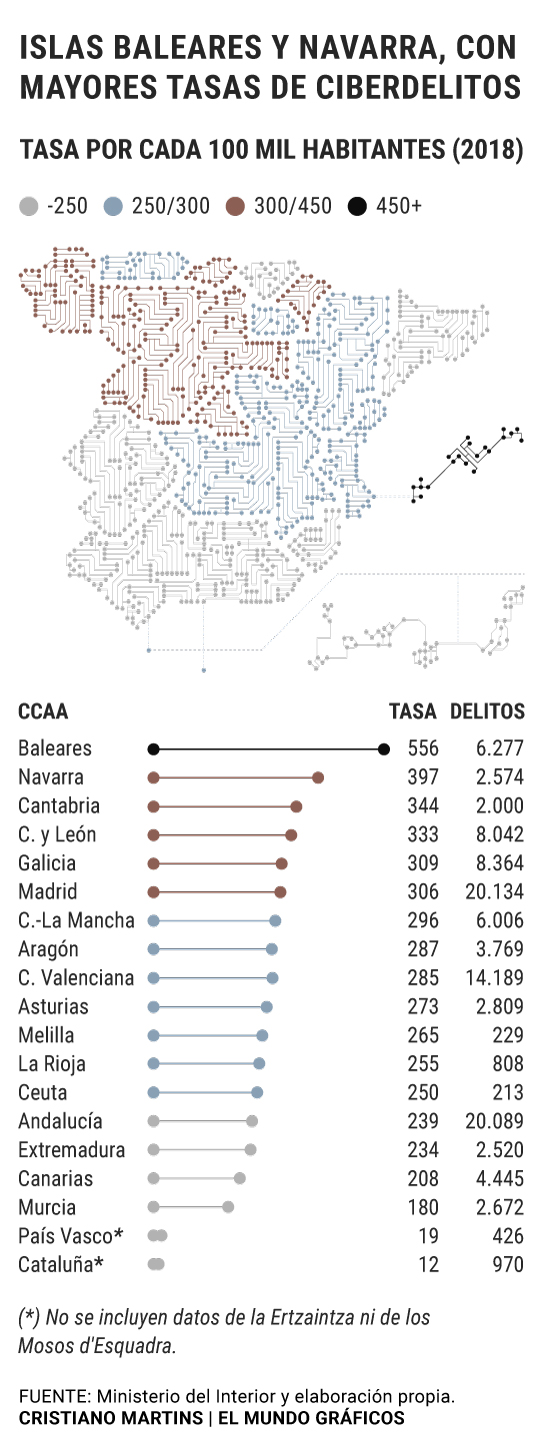- Scams. "He told me he loved me, but he was not a surgeon from the USA but a Nigerian scammer from Alicante"
- Crimes: 'Cybercrime', a crime with an impunity of "almost 100%" in Spain
- Analysis.Technologies and risks for 'cybercrime'
A network of Nigerians based in Alicante scammed 500,000 euros to Spanish women. The men fell in love with their victims pretending to be handsome white surgeons who were going to visit them upon arrival in Spain. It is one of the modalities of cybertimos discovered this year, but there are many more. The Ministry of Interior has detected a 36% increase in technological crimes committed in the last year.
Up to 110,613 complaints of cybercrime were recorded during 2018, which means an average of 303 cases a day or, what is the same, of 12 every hour. These figures do not include data from Catalonia or the Basque Country.
80% were computer frauds (scams) and 10% , threats and coercion. The rates per 100,000 inhabitants indicate that the Balearic Islands (with 556 cases), Navarra (397) and Cantabria (344) are the regions that concentrate the most complaints in this area. For eight years, when they began to be accounted for in statistics, they have shot up 200% .
Criminal lawyer and cyberbullying expert Sara G. Antúnez argues that the increase is explained by the anonymity under which criminals are protected and by the expansion of access to social networks: «94% of the population is connected to the Internet and there are people who, from the age of 10 have a smartphone . There are more people connected from anywhere ».
«On the internet there are no borders. There are what we call digital paradises , places where you can access and violate an information system from anywhere in the world, ”says Ángel Pablo Avilés , an expert in cybersecurity, adding that,“ although worldwide there is an extraordinary force to counteract crime and detain those responsible, the high degree of anonymity allows the network to commit up to murders.
22.4% of the cybercrimes that were reported last year were resolved, which translates into a balance of 5,697 arrests, according to the Ministry of Interior. In a ruling last March, the case of a woman who paid 800 euros for two iPhone 6S phones announced on a website but never received is told. The authorities discovered that there were more victims. The defendant was sentenced to nine months in prison for the crime of fraud and forced to return the money.
The methodology that criminals use to deceive their victims is varied in cyberstaffs. From a false love that asks for money after gaining the trust of its victim to an email simulating a communication from a public body for the payment of a debt, through false sales of products that do not exist or sending emails for the theft of bank data ( phishing ). The most common crimes, in 39% of cases, are scams with bank cards, credit cards and travelers checks. Who commits these crimes? Antúnez explains that the profile is usually that of a person with advanced knowledge of technology and that many times they are engineers or experts in information systems. The victim, on the other hand, can be any citizen: "We are all vulnerable to a scam, there is no precise profile," he emphasizes.
Among the 64,148 registered victims, 53% were men and 47% women. The most vulnerable people to this type of crime are those between 26 and 40 years old (22,776) followed by those between 41 and 60 years old (16,389 victims).
The problem is that not all cases reach the courts: during 2018, a total of 9,069 proceedings were initiated, only 10% of the total complaints filed by the Ministry of Interior. The lack of known authors prevents complaints from being transferred to the judicial sphere.
The latest report of the State Attorney General's Office warns that technology facilitates impunity due to "the many possibilities available for anonymization or concealment of the trail itself, the volatility of the evidence and the transnational nature of cyberspace."
National Cyber Security Institute recommends suspected in deals with very low prices, avoid proposals that ask for money upfront, not answer emails with suspicious extensions, or open files or links contained therein. And never provide personal and bank details, as it is the easiest way to usurp identities.
According to the criteria of The Trust Project
Know more- Spain
- National Police
TECHNOLOGY Why is INE interested in your trail and not you? "Data will change our lives"
Malaga: A predator who forced his two sisters to recreate sexual scenes of cinema
Innovation Nuria Oliver describes the INE data campaign as a "missed opportunity" due to a communication failure

